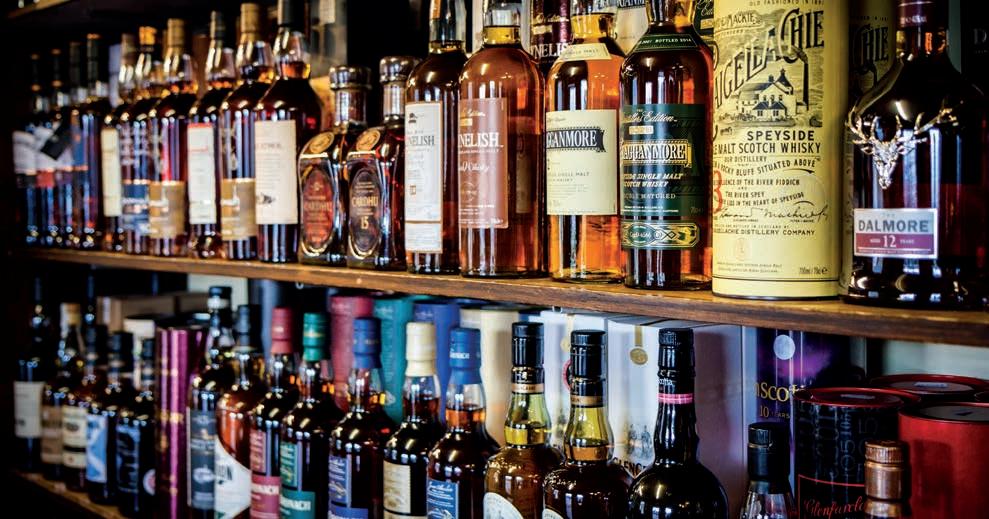
3 minute read
Whisky, the water of life
By Peter Mayne (Head of English, 1991–2007)
So what else would an ex Tudor Head of English and housemaster do after retiring but go and edit a definitive whisky guide? Well, apart from teaching for eight years at a girls’ grammar school and tutoring in London. Perhaps ‘Teachers’ and ‘Bells’ (puns fully intended) had something to do with it.
Whisky, in Gaelic uisge beatha, ‘water of life’ has been distilled in Scotland for hundreds of years. Some will claim that it was introduced by monks, but the process could have been chanced upon by Highland farmers – you take your pick. However, we don’t have a written record until 1494 in the Scottish Exchequer Rolls. It is essentially fermented grain mash, which may be malted (if it is, don’t call it Scotch – just Malt or Whisky). The grain may be barley, corn, rye or wheat depending on where it was made and whisky is distilled on every continent except Antarctica. To be whisky it must have spent at least three years in cask before bottling.
To many people whisky is purely ‘Scotch’ – a Scottish product. They may be dimly aware that there are different styles – smoky peat infused island products. They may know that some whiskies are called Single Malt, made from malted barley. Others ‘Blends’. Oh yes, and the Irish, they make whisky too don’t they? But they add an ‘e’ as in whiskey. Bourbon, is that whisk(e)y? Absolutely it is. And, to tell the truth, until recently the above ‘facts’ were about all I knew. Am I anything approaching an expert now? No – absolutely not. So why are you writing this article Mayne? Good question. A few years ago, I began editing the annual Whisky Bible for a friend, Jim Murray, his book being described by The Sunday Times as “regarded by connoisseurs as the most authoritative whisky guide.” Almost certainly Jim has visited more distilleries than anyone living, tastes and reviews 1,250 different whiskies each year, 20,000 in total as of 2019 and records his (very) personal opinion of each in his book. But this is not an article about him, just some of the things I have picked up along the way of our association.
The first time I was given a lesson in tasting it was twenty minutes before a drop was allowed to pass my lips. Now that kind of restraint is not for everyone, certainly not for me, but learning to appreciate the style, the craft and the skill that has gone into producing a particular whisky does deserve more than a brief ‘down the hatch’. After all, you wouldn’t do that even with the least pretentious wine. Equally, despite David Beckham’s ‘Make your own rules’ advertisement, urging you to add as much water or ice as you like to your whisky, I tend to think that such advice needs careful thought. How much water? Where from? Containing what sort of minerals? It occurs to me that if a producer is happy for you to drown their product then either we are talking a fairly indifferent blend or an organisation more interested in profit than quality. Yes, profit is vital – I get that – but so is the product. However, that is just my very personal opinion and if you like your drink that way, who am I to deny anyone their personal preference or, for that matter, a company a legitimate marketing strategy?
As mentioned earlier, whisky is distilled worldwide, India, Australia, Japan, Taiwan among many others. All produce some excellent whiskies. I remember fondly watching with Jim as Wales played Slovakia at football. We enjoyed a glass of Slovakian whisky during the first half (light and delicate) and a glass of Penderyn Welsh whisky during the second – well two really because Wales won.

You will have realised by now that this is not by any means a scholarly article, but an attempt to show that I have enjoyed my limited education in the subject. Whisky was made to drink though nowadays it is increasingly being bought and sold, sometimes for huge prices, as an investment. That seems a shame to me as an awful lot of really enjoyable spirit will never get to fulfil its proper function. But again, who am I to judge?
My favourite? That’s impossible to say as I have about 19,800 to catch up with my employer and obviously will never do so, but I am looking forward to putting a slight dent in his lead. R











